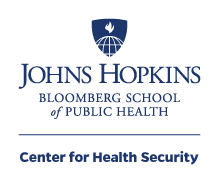The Center for Biosecurity of UPMC organized the International Conference on Biosafety and Biorisks in collaboration with the World Health Organization Communicable Disease Surveillance and Response (CSR) Office in Lyon, France. This meeting convened 150 scientists, health leaders and practitioners from all over the world to discuss biosafety and biosecurity challenges presented by SARS, influenza and other major epidemic threats, as well as the efforts needed to improve international cooperation prior to and during future epidemics. The conference was held in Lyon, France.
At the event, participants discussed the risks and promises of laboratory science in a public health response. For example, the contribution of laboratory research during the 2003 SARS epidemic was essential to the resolution of the epidemic. However, problems arose, and there are lessons to be learned for future outbreaks: Standards for exchanging and tracking research samples are lacking, laboratory escapes have highlighted the need for biosafety training and standards, and research communication standards are needed for critical information to cross professional disciplines.
For the future, effective public health management of pathogens (either natural or man-made) will require harmonization of biosafety, research, and communication standards among nations and across professional disciplines. This conference will give participants a chance to plan for the next multidisciplinary response to an epidemic-so it can be fast, accurate, and safe.
The Technical Foundation for Public Health Decisions: Caroline Ash
A discussion of the challenges of publishing good scientific data quickly-when political decisions are at stake.
Early Warning Systems for Global Public Health: Abla Mawudeku
The Global Public Health Intelligence Network (GPHIN) is a multilingual application that employs a unique combination of leading-edge technologies to provide an early warning system for potentially serious public health events around the world. Its purpose is to disseminate information on events that may have international implications.
Interpol and Bio-criminalization: Ronald K. Noble, JD
Interpol is promoting a global effort to deal with the transnational threat of bioterrorism, by encouraging nations to make reforms. This discussion will address the progress and plans for the future of "biocriminalization."
Preparedness for Deliberate Epidemics: Dr. Ottorino Cosivi
An overview of WHO activities to assist national preparedness for deliberate use of biological materials for harm, including a discussion of WHO guidance for public health response to biological and chemical weapons and WHO assistance for national threat assessments.
Health Security Cooperation in the European Union: Germain Thinus
Presentation of the EU Rapid Alert System, operational since 2002, which acts as a coordination mechanism for preparedness and response to biological and chemical agent attacks.
The Global Outbreak Alert and Response Network (GOARN): Dr. May C. Chu
GOARN is a technical collaboration of existing institutions and networks that pool human and technical resources for the rapid identification, confirmation, and response to outbreaks of international importance. This talk will focus on its recent efforts to combat influenza.
The New International Health Regulations: David Byrne
The final draft of the revised International Health Regulations will be presented to the World Health Assembly in May 2005. Mr. Byrne will discuss the new regulations to prepare for future epidemics.
Closing Remarks: Tara O'Toole, MD, MPH
Caroline Ash, Senior Editor, Science Magazine, Europe
David Byrne, Special Envoy to the World Health Organization
Jean-Marc Choukroun, PhD, Affiliate Faculty, Center for Organizational Dynamics, University of Pennsylvania; Principal, Park/Mathieson Group, Inc.
Dr. May C. Chu, Technical Officer, Emerging and Dangerous Pathogens, Alert and Response Operations, CSR/CDS/WHO
Dr. Ottorino Cosivi, Project Leader, Preparedness for Deliberate Epidemics, WHO Office in Lyon, Department of Communicable Disease Surveillance and Response (CSR)
Dr. Alain Jean Georges, Director of INSERM Laboratoire P4
James Grant, Business Development Manager for Behavioral Science Technology, Inc.
Gigi Kwik Grönvall, PhD, Fellow, Center for Biosecurity of UPMC
Jesper Grönvall, MS, Senior Analyst, CRISMART, Swedish National Defense College
D. A. Henderson, MD, MPH, Professor of Public Health and Medicine, University of Pittsburgh; Resident Fellow, Center for Biosecurity UPMC; Dean Emeritus, Johns Hopkins School of Public Health
David Heymann, MD, Special Representative of the WHO Director General, World Health Organization; Former Executive Director of Communicable Diseases, WHO
Prof. Dr. Rolf Hilgenfeld, Director of the Institut für Biochemie (Institute of Biochemistry), University of Lübeck
Brad Kay, MS, MPH, DrPh, Coordinator, Laboratory Capacity Development and Biosafety, WHO Office in Lyon, Department of Communicable Disease Surveillance and Response (CSR)
Dr. Wilina Lim, Consultant Medical Microbiologist with the Virology Division, Public Health Laboratory Services, Centre for Health Protection, Department of Health, Hong Kong
Abla Mawudeku, Manager, Global Public Health Intelligence Network (GPHIN), Centre for Emergency Preparedness and Response, Public Health Agency of Canada
Ronald K. Noble, JD, Secretary General of Interpol
Tara O'Toole, MD, MPH, CEO and Director, Center for Biosecurity of the University of Pittsburgh Medical Center
Dr. Amanda Ozin, Project Manager of Anthrax EuroNet, based in the Max Planck Institute for Infection Biology in Berlin, Germany
Marjorie Pollack, MD, Associate Editor, Epidemiological and Surveillance Moderator,and Associate Editor for Subregional Programs for ProMED-mail, a program of the International Society of Infectious Diseases
Dr. Nicoletta Previsani, Project Leader, Biosafety, WHO Office in Lyon, Department of Communicable Disease Surveillance and Response (CSR)
Jonathan Richmond, PhD, Former Director, Office of Health and Safety, CDC; Jonathan Richmond and Associates, Inc.
Guénaël R. Rodier, MD, Director, Communicable Disease Surveillance and Response, CDS/CSR, World Health Organization
Amin Soebandrio, MD, Assistant Deputy Minister for Research and Technology for Health and Medical Sciences, Indonesia
Germain Thinus, Project Leader of the Coordination Mechanism, European Commission
Robert G. Webster, PhD, Rose Marie Thomas Chair of the Virology Division, Department of Infectious Disease, St. Jude Children's Research Hospital, Memphis, TN; Director, WHO Collaborating Center on the Ecology of Influenza Viruses in Lower Animals and Birds






